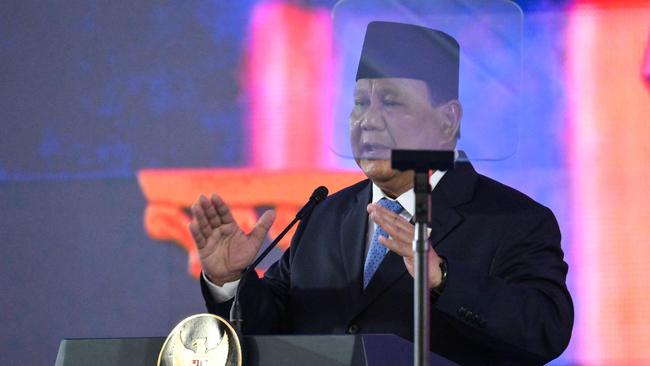Indonesian President Prabowo Subianto pushed ahead on Monday with the mass privatisation of state-owned assets under a new $US20bn ($31.4bn) sovereign wealth fund

Indonesian President Prabowo Subianto pushed ahead on Monday with the mass privatisation of state-owned assets under a new $US20bn ($31.4bn) sovereign wealth fund, promising it would “revolutionise” how the country managed its wealth amid a growing backlash against his government’s austerity measures.
The launch of the new Danantara state development fund at Jakarta’s state palace follows days of nationwide protests over Mr Prabowo’s extreme budget cuts of up to $US44bn designed to free up money for his flagship free school meals program and to help kickstart the new wealth fund.
The President, who took office in October, has said the fund’s primary role will be to underwrite more than a dozen multibillion-dollar megaprojects – including renewable energy, advanced manufacturing, infrastructure and artificial intelligence technology – without tapping external financing.
But the plan has raised as many doubts as it has hopes, as government critics warn of the dangers of placing the country’s most valuable public assets under the control of the executive, even as supporters tout its potential to fund a broader national modernisation project.
Mr Prabowo has repeatedly spoken of the desire to build a wealth fund similar to Singapore’s Temasek, but was forced to delay the launch by several months so new laws allowing the move could be passed. On Monday he cited a constitutional clause decreeing Indonesia’s economy should be “organised as a common endeavour based on family principles” as legal justification for the move, and sought to frame the Danantara as the key to unlocking the country’s vast, unrealised potential.
“After 80 years of independence why do some of our children still go hungry? Why do our farmers and fishermen continue to struggle to earn a decent living despite their hard work? Why do some villages and cities remain without access to essential services? More importantly, how can we fix this?” he said. “To address these challenges we must respond boldly and strategically
“Through Danantara we send a message to the world that we are ready to collaborate … Indonesia is open for business, open for investment and open for shared prosperity.”
“It is also part of the government’s commitment to realising a grand vision to elevate Indonesia’s economy to a higher level through sustainable and inclusive investments,” the presidential communications office press statement added.
Danantara is expected to manage more than $US900bn in state-owned assets, including Indonesia’s monopoly PLN power company. It aims to use those assets as collateral for strategic investments, and to improve management of those assets to maximise profits that can be ploughed into key projects.
But critics have warned of the risks Danantara could end up looking more like Malaysia’s disastrous and corruption-tainted 1MDB than Singapore’s stratospherically wealthy Temasek if not managed scrupulously.
Former Malaysian prime minister Najib Razak is serving a six-year sentence on corruption convictions and faces dozens more charges related to the misappropriation of more than $US4.5bn from the 1MDB state development fund.
Bhima Yudhistira, director of the Centre of Economic and Law Studies, told The Australian Danantara had huge potential to help finance nation-building projects, including Indonesia’s planned energy transition from coal to renewables. But key to its success would be its adherence to international environmental, social and governance standards, and a board of directors free from political or personal conflicts of interest, he added.
An editorial in Indonesia’s respected Tempo magazine also warned Danantara could weaken global market confidence in Indonesia given its commissioners and board of directors – headed by current SOE Minister Erick Thohir – would no longer be subject to the same anti-corruption laws that apply to other public officials.



To join the conversation, please log in. Don't have an account? Register
Join the conversation, you are commenting as Logout